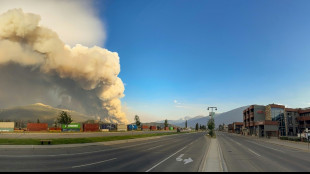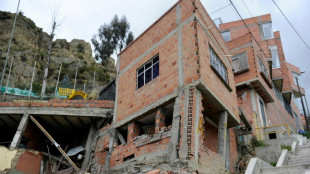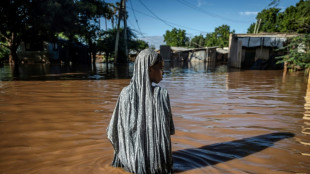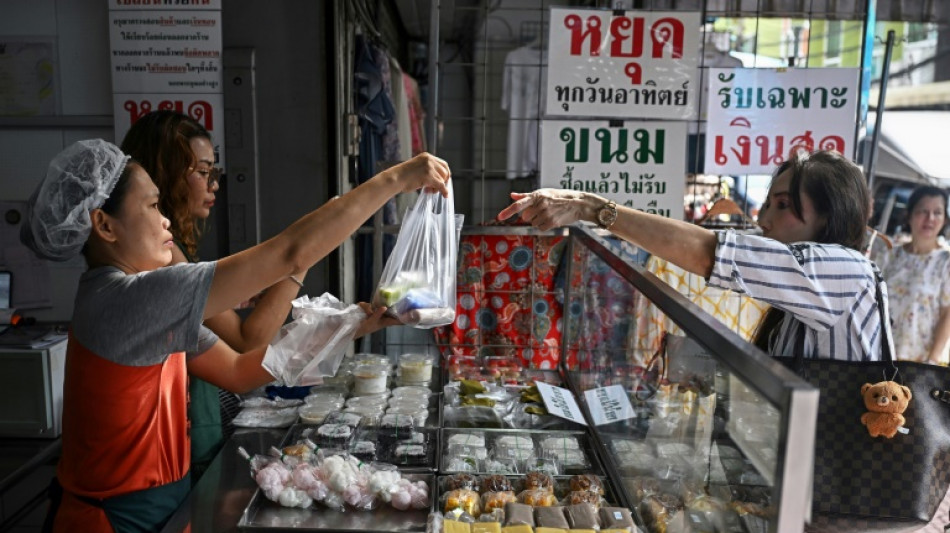
-
 Mitchell leads Cavs over Pacers, Thunder beat 76ers
Mitchell leads Cavs over Pacers, Thunder beat 76ers
-
S. Korea's Yoon: from rising star to historic arrest

-
 Ominous Alcaraz sweeps into Australian Open third round
Ominous Alcaraz sweeps into Australian Open third round
-
'Queen Wen' deposed in huge shock at Australian Open

-
 Vigilante fire clean-up launched by local Los Angeles contractor
Vigilante fire clean-up launched by local Los Angeles contractor
-
Zheng dumped out in huge shock as shaky Sabalenka battles through

-
 Asian equities mixed as US inflation, China data loom
Asian equities mixed as US inflation, China data loom
-
'Queen Wen' Zheng deposed in huge shock at Australian Open

-
 Renewed US trade war threatens China's 'lifeline'
Renewed US trade war threatens China's 'lifeline'
-
China's economy seen slowing further in 2024: AFP survey

-
 Shaky Sabalenka overcomes serve struggles to stay alive in Melbourne
Shaky Sabalenka overcomes serve struggles to stay alive in Melbourne
-
South Korea's six weeks of political chaos

-
 Japan's tourism boom prices out business travellers
Japan's tourism boom prices out business travellers
-
What is the pink stuff coating fire-ravaged Los Angeles?

-
 Mediators make final push for Gaza truce deal
Mediators make final push for Gaza truce deal
-
Musk, Bezos, Zuckerberg to attend Trump inauguration: report

-
 Federal probe begins into deadly Los Angeles fires
Federal probe begins into deadly Los Angeles fires
-
'We may look easy-going, but...' Canadians veto Trump's merger plan

-
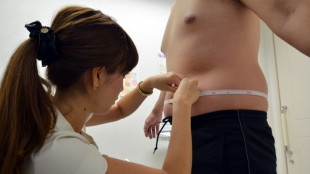 Is obesity a disease? Sometimes but not always, experts decide
Is obesity a disease? Sometimes but not always, experts decide
-
Biden issues land protections after LA fires delay ceremony

-
 Cuba to free over 550 prisoners after removal from US terror list
Cuba to free over 550 prisoners after removal from US terror list
-
Williams, Vine vie for season-opening Tour Down Under crown

-
 Maresca 'concerned' as Chelsea winless run stretches to five games
Maresca 'concerned' as Chelsea winless run stretches to five games
-
'Outstanding' Liverpool deserved more than Forest draw: Slot

-
 Guardiola laments Man City decision-making in Brentford collapse
Guardiola laments Man City decision-making in Brentford collapse
-
Marseille dumped out of French Cup on penalties

-
 Liverpool frustrated by Forest, Man City blow late lead at Brentford
Liverpool frustrated by Forest, Man City blow late lead at Brentford
-
Djokovic, Sabalenka chase history as Australian Open hits round two

-
 Golf star Woods pledges support amid 'unimaginable loss' of LA fires
Golf star Woods pledges support amid 'unimaginable loss' of LA fires
-
Liverpool held by Forest, Man City blow late lead at Brentford

-
 Cuba to free 553 prisoners after removal from US terror list
Cuba to free 553 prisoners after removal from US terror list
-
Leverkusen win to go one point behind Bayern, Kiel down Dortmund

-
 Jota rescues leaders Liverpool in Forest draw
Jota rescues leaders Liverpool in Forest draw
-
Title chasers Atalanta held by Juve, Milan hand Conceicao maiden Serie A win

-
 Man City blow late lead at Brentford, Chelsea held by Bournemouth
Man City blow late lead at Brentford, Chelsea held by Bournemouth
-
Rast charges through on second run to win Flachau slalom

-
 Grimaldo scores as Leverkusen go one point behind Bayern, Dortmund lose
Grimaldo scores as Leverkusen go one point behind Bayern, Dortmund lose
-
Starbucks shift on non-paying visitors stirs debate in US

-
 Clashes as S. Korean investigators attempt to arrest President Yoon
Clashes as S. Korean investigators attempt to arrest President Yoon
-
US, Japanese lunar landers set to launch on single rocket
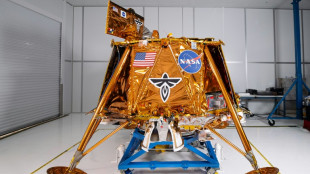
-
 Boeing 2024 plane deliveries tumble on labor, safety woes
Boeing 2024 plane deliveries tumble on labor, safety woes
-
US removes Cuba from state sponsors of terror list

-
 Argentine annual inflation nosedives, in boost for Milei
Argentine annual inflation nosedives, in boost for Milei
-
S. Korea investigators arrive in new attempt to arrest President Yoon

-
 Pressure builds on Dortmund boss Sahin after loss at Kiel
Pressure builds on Dortmund boss Sahin after loss at Kiel
-
Meta to lay off 3,600 employees in performance-based cuts

-
 Venezuela restricts diplomats from 'hostile' European countries
Venezuela restricts diplomats from 'hostile' European countries
-
Trump's Pentagon pick grilled by senators as cabinet hearings begin

-
 From ban to buyout: What next for TikTok in the US?
From ban to buyout: What next for TikTok in the US?
-
Lazio sack doc who performed far-right falconer's penis op: club owner


How single-use plastic still rules the world
Each year the world produces around 400 million tonnes of plastic waste, much of it discarded after just a few minutes of use.
Negotiators hope to reach the world's first treaty on plastic pollution this year, but across five very different countries, AFP found single-use plastic remains hugely popular as a cheap and convenient choice, illustrating the challenges ahead:
Bangkok
On a Bangkok street lined with food vendors, customers line up for Maliwan's famed traditional sweets.
Steamed layer cakes -- green with pandan leaf or blue with butterfly pea -- sit in clear plastic bags alongside rows of taro pudding in plastic boxes.
Each day, the 40-year-old business uses at least two kilos of single-use plastic.
"Plastic is easy, convenient and cheap," said 44-year-old owner Watchararas Tamrongpattarakit.
Banana leaves used to be standard, but they are increasingly expensive and hard to source.
They are also onerous to use because each one must be cleaned and checked for tears.
It "isn't practical for our pace of sales", said Watchararas.
Thailand started limiting single-use plastic before the pandemic, asking major retailers to stop handing out bags for free.
But the policy has largely fallen by the wayside, with little uptake among the country's street food vendors.
Thailand produces two million tons of plastic waste a year, according to the country's Pollution Control Department.
The World Bank estimates 11 percent goes uncollected, and is burned, disposed of on land or leaks into rivers and the ocean.
Watchararas tries to consolidate purchases into fewer bags and said some customers bring their own reusable containers and totes.
But Radeerut Sakulpongpaisal, a Maliwan customer for 30 years, said she finds plastic "convenient".
"I also understand the environmental impact," the bank worker said.
But "it's probably easier for both the shop and the customers".
Lagos
In the Obalende market at the heart of Nigeria's economic capital Lagos, emptied water sachets litter the ground.
Each day, Lisebeth Ajayi watches dozens of customers use their teeth to tear open the bags of "pure water" and drink.
"They don't have the money to buy the bottle water, that's why they do the pure water," said the 58-year-old, who sells bottles and bags of water, soap and sponges.
Two 500-millilitre sachets sell for between 50 to 250 naira (3-15 US cents), compared to 250-300 naira for a 750-ml bottle.
Since they appeared in the 1990s, water sachets have become a major pollutant across much of Africa, but they remain popular for drinking, cooking and even washing.
Around 200 firms produce the sachets in Lagos, and several hundred more recycle plastic, but supply vastly outstrips capacity in a country with few public wastebins and little environmental education.
Lagos banned single-use plastic in January, but with little impact so far.
The United Nations estimates up to 60 million water sachets are discarded across Nigeria every day.
Rio
Each day, vendors walk the sands of some of Rio de Janeiro's most beautiful beaches, lugging metal containers filled with the tea-like drink mate.
The iced beverage, infused with fruit juice, is dispensed into plastic cups for eager sun worshippers dotted along the seafront.
"Drinking mate is part of Rio de Janeiro's culture," explained Arthur Jorge da Silva, 47, as he scouted for customers.
He acknowledged the environmental impacts of his towers of plastic cups, in a country ranked the fourth-biggest producer of plastic waste in 2019.
But "it's complicated" to find affordable alternatives, he told AFP.
The tanned salesman said mate vendors on the beach had used plastic for as long as he could remember.
He pays a dollar for a tower of 20 cups and charges customers $1.80 for each drink.
Bins along Rio's beaches receive about 130 tons of waste a day, but plastic is not separated, and just three percent of Brazil's waste is recycled annually.
Evelyn Talavera, 24, said she does her best to clean up when leaving the beach.
"We have to take care of our planet, throw the garbage away, keep the environment clean."
Plastic straws have been banned in Rio's restaurants and bars since 2018, and shops are no longer required to offer free plastic bags -- though many still do.
Congress is also considering legislation that would ban all single-use plastic.
Paris
In France, single-use plastic has been banned since 2016, but while items like straws and plastic cutlery have disappeared, plastic bags remain stubbornly common.
At Paris' Aligre market, stalls are piled with fruit, vegetables and stacks of bags ready to be handed out.
Most are stamped "reusable and 100-percent recyclable", and some are described as compostable or produced from natural materials.
But experts have cast doubt on the environmental relevance of some of these claims.
Vendor Laurent Benacer gets through a 24-euro ($26) box of 2,000 bags each week.
"In Paris, everyone asks for a bag," he told AFP.
"I'd stopped, but my neighbours continued, so I had to restart."
There are alternatives like paper bags, but some customers are simply not convinced.
"Plastic bags remain practical, so everything doesn't spill everywhere," insisted 80-year-old customer Catherine Sale.
Dubai
At the Allo Beirut restaurant in Dubai, plastic containers are piled high, waiting to be filled and delivered across the city.
"We receive more than 1,200 orders a day," said delivery manager Mohammed Chanane.
"We use plastic boxes because they are more airtight, and better preserve the food," he said.
With few pedestrians and an often-scorching climate, many of Dubai's 3.7 million residents rely on delivery for everything from petrol to coffee.
Residents of the United Arab Emirates have one of the highest volumes of waste per capita in the world.
And single-use plastic accounts for 40 percent of all plastic used in the country.
Since June, single-use plastic bags and several similar items have been banned. Polystyrene containers will follow next year.
Allo Beirut is considering using cardboard containers, a move customer Youmna Asmar would welcome.
She admitted horror at the build-up of plastic in her bins after a weekend of family orders.
"I say to myself, if all of us are doing this, it's a lot."
burs/sah/sco/fg
O.Krause--BTB

